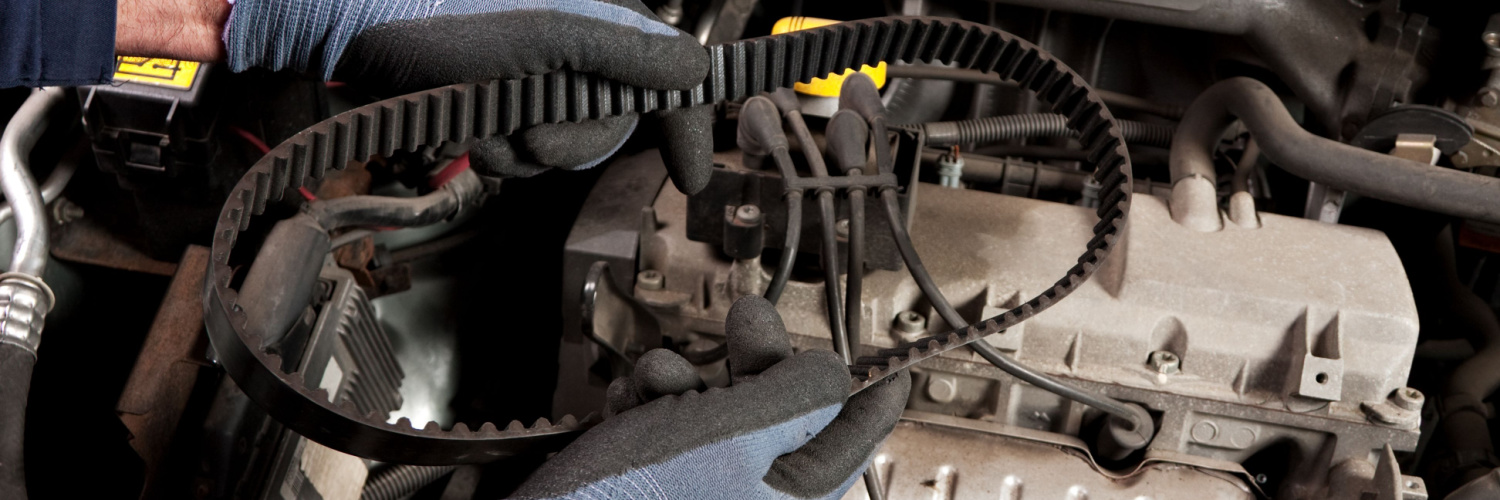Timing Belt Replacement in Hollywood Park, TX

What Is a Timing Belt?
A timing belt is a crucial component of an internal combustion engine that synchronizes the rotation of the engine’s camshaft and crankshaft. It ensures that the engine’s valves open and close at the correct time, allowing for proper fuel combustion and efficient engine operation. The timing belt is typically made of rubber with high tensile strength and is reinforced with fibers to withstand the demands of engine operation.
Over time, timing belts can wear out, become brittle, or develop cracks, which can lead to belt failure. If a timing belt fails while the engine is running, it can result in severe engine damage and costly repairs. Therefore, regular timing belt replacement is essential to maintain the reliability and performance of the engine.
What Is a Timing Belt Replacement?
A timing belt replacement refers to the process of removing the worn-out timing belt from the engine and installing a new one. It is an essential maintenance procedure to prevent timing belt failure, which can lead to severe engine damage.
During a timing belt replacement, our technicians will carefully remove the necessary engine components to access the timing belt, such as the timing belt cover, tensioner, and idler pulleys. The old timing belt is then removed, and the new timing belt is installed according to the manufacturer’s specifications.
The installation process requires precise alignment of the crankshaft and camshaft to ensure proper synchronization. The tensioner and idler pulleys are also inspected and, if necessary, replaced to ensure optimal belt tension and smooth operation. Once the new timing belt is in place, the engine components are reassembled, and the system is tested to ensure everything is functioning correctly.
Timing belt replacement intervals vary depending on the vehicle’s make, model, and manufacturer’s recommendations. It is crucial to follow the recommended maintenance schedule and replace the timing belt at the specified interval to prevent potential belt failure and engine damage.
By regularly replacing the timing belt as part of your vehicle’s maintenance routine, you can ensure the continued performance and reliability of your engine.
If you are unsure about the timing belt replacement interval for your vehicle or suspect any issues with your timing belt, contact Larson’s Automotive in Hollywood Park, TX. Our team can provide expert guidance and perform the necessary replacement when needed.
Difference Between a Timing Belt and Timing Chain
While timing belts and timing chains serve the same purpose of synchronizing the engine’s camshaft and crankshaft, they differ in their construction and materials. Timing belts are made of rubber and require periodic replacement due to wear and degradation. In contrast, timing chains are made of metal and are designed to last the lifetime of the engine with proper maintenance. Many modern vehicles use timing chains instead of belts for their durability and longevity.
What Are the Signs That a Timing Belt Needs to Be Replaced?
It is essential to recognize the signs that indicate a timing belt may need replacement to prevent unexpected failure and potential engine damage. Here are some common signs to watch for:
Age or Mileage: Most manufacturers provide recommended timing belt replacement intervals, typically ranging from 60,000 to 100,000 miles or 5 to 7 years. If your vehicle has reached or exceeded these milestones, it is crucial to consider replacing the timing belt.
Cracking, Fraying, or Glazing: Inspect the condition of the timing belt regularly. If you notice any visible signs of cracking, fraying, or glazing on the belt’s surface, it indicates wear and potential failure. Replace the timing belt promptly.
Squealing or Whining Noise: A worn-out timing belt can produce unusual noise, such as squealing or whining, especially during engine startup or acceleration. These noises may indicate a loose or slipping belt that needs immediate attention.
Engine Misfires or Performance Issues: If the timing belt becomes worn or stretched, it can disrupt the engine’s timing, resulting in misfires, reduced power, or poor acceleration. These performance issues may indicate a failing timing belt.
Oil Leakage: In some cases, engine oil leaks can cause premature deterioration of the timing belt. If you notice oil leakage near the timing belt area, it is crucial to address the issue promptly and consider replacing the timing belt.
What Happens if You Drive With a Bad Timing Belt?
Driving with a bad timing belt can have severe consequences for your engine. If the timing belt fails while the engine is running, the camshaft and crankshaft will lose synchronization, causing the valves to collide with the pistons. This collision can lead to bent valves, damaged cylinder heads, and even catastrophic engine failure. Repairing the resulting engine damage can be costly and time-consuming. Therefore, it is crucial to replace a worn or failing timing belt before it fails to ensure the continued performance and reliability of your engine.
Book a Timing Belt Replacement Service in Hollywood Park, TX at Larson’s Automotive
If you suspect any issues with your timing belt or need a timing belt replacement, Larson’s Automotive in Hollywood Park, TX, is here to help. Our team of skilled technicians specializes in timing belt inspections, replacements, and overall engine maintenance. Contact us today to schedule an appointment and ensure the proper functioning of your engine with a reliable timing belt.

